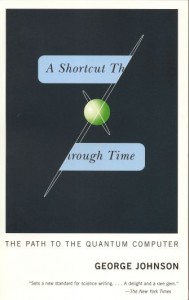 I had the good feeling this week of getting over a hump: I have four chapters solidly drafted and the beginning of a fifth. That’s approaching about 20,000 words, perhaps a quarter of a book. Before I surrender the manuscript I will have gone through each of those chapters maybe a hundred more times, tweaking sentences, double and triple-checking facts, tearing apart paragraphs and pages that suddenly don’t seem so solid after all. A chapter that has gotten too big might split mitotically into two chapters, which each in itself will start to grow. In a kind of violation of the arrow of time, seeds will be planted retrospectively in early chapters — foreshadowing ideas already written into later parts of the book. Sometimes I think of them as chords partially plucked, later to be resolved. A little grandiose maybe for what is at best prestidigitation.
I had the good feeling this week of getting over a hump: I have four chapters solidly drafted and the beginning of a fifth. That’s approaching about 20,000 words, perhaps a quarter of a book. Before I surrender the manuscript I will have gone through each of those chapters maybe a hundred more times, tweaking sentences, double and triple-checking facts, tearing apart paragraphs and pages that suddenly don’t seem so solid after all. A chapter that has gotten too big might split mitotically into two chapters, which each in itself will start to grow. In a kind of violation of the arrow of time, seeds will be planted retrospectively in early chapters — foreshadowing ideas already written into later parts of the book. Sometimes I think of them as chords partially plucked, later to be resolved. A little grandiose maybe for what is at best prestidigitation.
I tried to describe the process in the prologue to an earlier book, in which I decided to let some of the seams show:
Like any kind of writing, science writing involves spinning an illusion. All the hard intellectual work — digging through the piles of papers and reference books, reading the same paragraph a dozen times before firing off yet another emailed plea for clarification — all this takes place behind a curtain, carefully hidden from view. What ultimately emerges, Oz-like, is a narrator who speaks with the resounding, omniscient voice of authority, a being seemingly born with encyclopedic knowledge instantly retrieved and dispensed. And that, of course, is a fiction. A friend who was reading one of my books once asked, “Do you actually know all those things you put in there, or do you have to look them up?” She was relieved to hear that what seemed a smooth flow of erudition was haltingly cobbled together after multiple trips to the library. “But isn’t that cheating?” she said. I think she was kidding, but sometimes I feel that way. I leaf through the index of a book I’ve written and marvel, “What in the world did I have to say about Plotinus or Aristotle?”
This time I have tried not to cheat. In the pages that follow, the surface has been left somewhat translucent offering dim glimpses of the man behind the curtain fumbling at the controls — straining to grasp an idea with an imprecise metaphor, only to discard it for another with a tighter fit, closing in on an airy notion from several directions, triangulating on approximate truth.
I’ve also tried to resist the temptation to say too much. Fascinating as they are, many of the more tangential details will remain wrapped inside their boxes. We are operating here on a need to know basis. (Those who want to look deeper can refer to my annotations at the end of the book, called “The Fine Print,” a section that can also be taken as a gloss on the nature and limitations of science writing.)
More than ever, I want the reader to feel that we are both on the same side — outsiders seeking a foothold on the slippery granite face of a new idea.
My guiding light has been a statement by the writer Alan Lightman about what makes a good essay. I think it applies as well to a good nonfiction book:
“For me, the ideal essay is not an assignment, to be dispatched efficiently and intelligently, but an exploration, a questioning, an introspection. I want to see a piece of the essayist. I want to see a mind at work, imagining, spinning, struggling to understand.”
— A Shortcut Through Time
Here is the whole prologue: Inside the Black Box.
3 Comments
Hi George, this is a beautiful snapshot of the writing process. Thank you for posting it. I’m always partial to works that show, in part, the authors reporting process. For example, David Quammen often writes a little about how he comes to know what he does. As a reader, I like the feeling of learning along with the narrator. I look forward to reading your finished work.
Hi George, That was such a beautiful description of the process of writing, as you practice it. I’ve heard you speak so many hours on Blogging heads, but haven’t read any of your books. After reading that lovely bit of writing above, I’m looking forward to getting your book when it comes out. Thank you so much, and thank you also for all the delightful hours of conversation on Bloggingheads TV. I listen to the conversations again and again. What a pleasure they are!
Hi George. Loved this piece not only because of the writing but because I’m going through much of the same processes as I work on a personal memoir. Trouble is, it’s lengthening the book! Been a long time since we toured the SNL MPP facilities. I’ve given up that gig now, as of 2.28.11, with commensurate loss of revenues. It gives me time for my own writing, but I miss working with the creative sci/tech crowd.